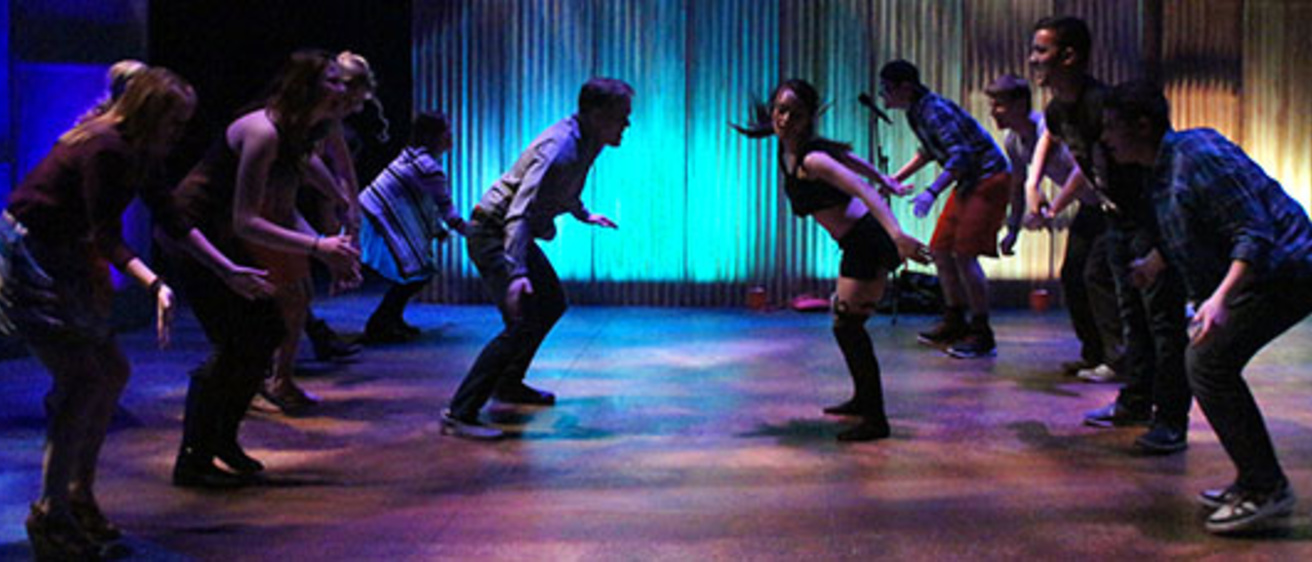A unique collaboration among Big Ten theater departments is putting female playwrights, directors, and actors in the spotlight while sparking campus conversations about important social issues.
In the spring of 2014, the Big Ten Theatre Consortium, consisting of theater department heads from Big Ten Conference universities, began to commission plays starring, written by, and directed by women as part of its New Play Initiative.
Alan MacVey, director of the Division of Performing Arts at the University of Iowa, proposed the initiative in 2010 to counteract the lack of complex roles for women—young women in particular—and the lack of female playwrights in the industry.
Female roles, often written by men, were frequently written as supporting or minor characters with fewer lines than their male counterparts, which would prove problematic for theater departments when selecting scripts for students to perform, says MacVey. He saw the initiative as a way to address this imbalance and give female students more opportunities at lead and dialogue-heavy roles.
Though it began as a three-year project, the program will continue into its fifth year, with the option to go on for another five after that.
Every year, the consortium commissions a new play. Big Ten theater departments have exclusive rights to produce it in its first year and can perform it royalty-free for three years. After the first year, the play becomes available for production at other schools and professional theaters, and the playwright can begin collecting royalties.
The initiative represents the first time the Big Ten Consortium collaborated on a project. All 14 schools contribute funds toward an artist payment of $10,000 per play.
Each of the plays explores the impacts of different social issues on college campuses, with the first two plays, Good Kids, by Naomi Iizuka, and Baltimore, by Kirsten Greenridge, focusing primarily on sex and race, respectively.
"These plays have been created for college-age audiences and address themes that are important to the college experience," says MacVey."The first four plays are set on college campuses and predominantly feature college-age characters."
Next year's play, Twilight Bowl, by Rebecca Gilman, will explore class and the various socioeconomic backgrounds of a student body. The following year, Dog Stars, by Madeleine George, will examine scientific research on animals at universities.
Both plays have been well received by students at the UI and at other theater departments in the Big Ten.
Priscilla Lindsay, chair of the University of Michigan's Department of Theatre and Drama, says that Good Kids, which UM produced in the fall of 2014, sparked a dialogue about sexual assault on their campus.
"It changed the way we interact with other campus associations dealing with sexual assault prevention and awareness, and we were very aware of the impact the show had on those who saw it and were in it," says Lindsay. "We are committed, as a department, to producing another play in the initiative and to choosing plays with good, strong roles for women, written by women, and aimed at issues that are pertinent to college-aged folks."
The initiative also is being used as a teaching tool for the next generation of students. On March 25, several graduate students from the Iowa Playwrights Workshop, the UI's MFA program in playwriting, worked with more than 100 local high school students on field trips from Iowa City High School, Elizabeth Tate High School in Iowa City, and Metro High School in Cedar Rapids. Students divided into small groups and attended either a playwriting or acting workshop that each lasted nearly two hours.
Alysha Oravetz, a second-year graduate student in the Playwrights Workshop from Johnstown, Pennsylvania, led one of the playwriting workshops and utilized exercises she learned in her own classes.
During one exercise, she gave the students prompts from which they had fifteen minutes to craft a story.
"The students quickly took a liking to the exercises," says Oravetz. "They were surprised by their own abilities and told me, 'We didn't know we could write that fast.'"
After the workshops, the students reconvened to watch Baltimore and participated in a group discussion after the play.
Oravetz says the group responded positively to the women in leading roles and the diversity of the cast. They wanted to learn more about the actors as well.
"They likely weren't able to process everything they were exposed to right then and there," Oravetz says. "It might be upon reflection in a few months or years that they'll feel the impact this had on their development."
